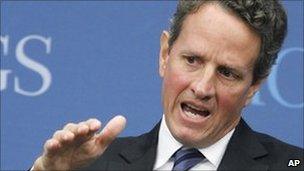America's Timothy Geithner warns China on yuan
- Published

Timothy Geithner made some very pointed comments without naming any countries
US Treasury Secretary Timothy Geithner has pressed China to let the value of the yuan rise against other currencies.
Speaking at IMF talks in Washington, Mr Geithner said nations relying too much on exports must change their policies, or global economic growth would slow.
He said major emerging economies should move towards "a more flexible, market-oriented currency policy".
In response, China blamed rich nations for problems in the currency markets that have hit many developing nations.
'Stark challenges'
The tension over between the US and China over currency policy surfaced once again at the International Monetary Fund (IMF) talks.
Mr Geithner renewed the pressure on China to allow its currency to rise. He named no names, but he was talking mainly about China.
The US has a long-standing grievance over China's currency policy, which limits the movement of the yuan against the dollar. The American complaint is that it gives Chinese exporters an unfair competitive advantage.
There was a vigorous response from Zhou Xiaochuan, governor of China's central bank (The People's Bank of China), who blamed the rich countries for problems in the currency markets.
Mr Zhou said extremely low interest rates in rich countries had created "stark challenges for emerging market countries".
Price bubbles
More recently, many developing countries have had to contend with their own currencies rising and undermining their competitiveness.
The problem is that those low interest rates in the developed world have led investors to seek higher returns elsewhere, in emerging markets.
To invest in those markets, they need to buy the currency and that pushes its value up. That in turn makes those countries' goods more expensive for foreign buyers and the overseas investment money creates a danger of unsustainable bubbles in their property and financial markets.
China has stopped its currency rising much by buying foreign currency. If it were to refrain from that and allow the yuan to rise, it would probably help other developing countries that compete with China, as well as the US which is protesting the most.
But there is another force behind the rising developing world currencies. Their economies are growing robustly, while the rich countries are not.
That uneven global economic recovery is a problem that cannot be quickly fixed.
- Published9 October 2010
- Published6 October 2010
- Published7 October 2010
- Published5 October 2010
- Published30 September 2010